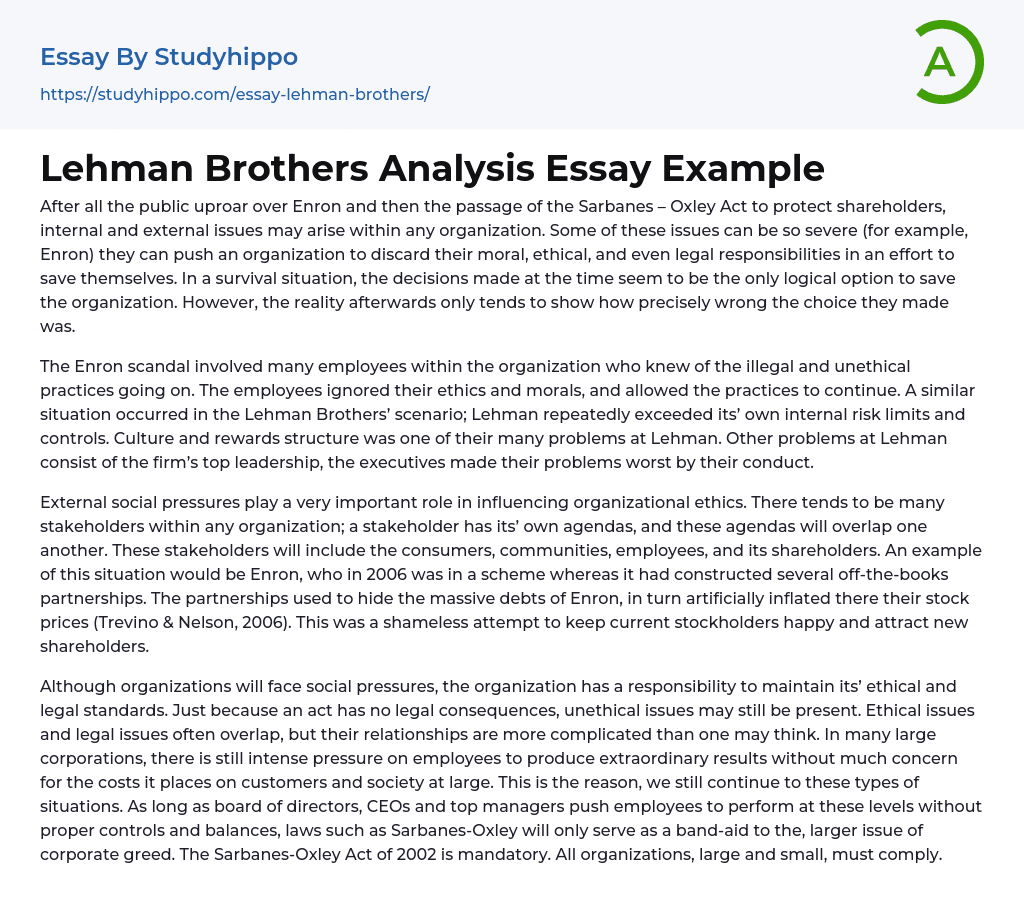After the Enron scandal and the implementation of the Sarbanes – Oxley Act to protect shareholders, organizations may face both internal and external challenges. These difficulties, as seen in the case of Enron, can be so serious that they force the organization to neglect its moral, ethical, and legal responsibilities in order to safeguard itself. In a situation where survival is on the line, the decisions made may seem like the only rational choice for preserving the organization. However, upon reflection, it becomes clear that the chosen course of action was fundamentally wrong.
Both the Enron scandal and the Lehman Brothers' scenario shared a common element - employees being aware of illegal and unethical practices within their organization. These employees made the conscious decision to disregard their own principles, allowing these practices to persist. Furthermore, Lehman Brothers faced additional com
...plications including exceeding its internal risk limits and controls, as well as grappling with issues regarding its culture and reward system. The actions of the company's top leadership only exacerbated the situation.
The ethics of an organization are greatly influenced by external social pressures, as different stakeholders within the organization have their own agendas that often intersect. These stakeholders consist of consumers, communities, employees, and shareholders. Enron provides a significant illustration of this phenomenon. In 2006, Enron engaged in a scheme wherein it established undisclosed partnerships to hide its massive debts and artificially boost its stock prices. This unethical conduct was intended to satisfy existing stockholders and entice new ones (Trevino & Nelson, 2006).
Despite facing social pressures, organizations have a duty to uphold their ethical and legal standards. It i
crucial to acknowledge that an action can lack legal consequences but still involve unethical concerns. The relationship between ethical and legal issues is intricate and often interconnected. Numerous large corporations exert immense pressure on employees to achieve exceptional outcomes, sometimes disregarding the impact on customers and society as a whole. This is why such situations continue to arise. As long as board of directors, CEOs, and top managers push employees to perform at these levels without sufficient controls and checks, laws like Sarbanes-Oxley will only offer surface-level solutions to the wider issue of corporate greed. The Sarbanes-Oxley Act of 2002 applies universally to all organizations, irrespective of their size.
- Values of Life essays
- Ethical dilemma essays
- Normative Ethics essays
- Virtue Ethics essays
- Belief essays
- Deontology essays
- Moral essays
- Virtue essays
- Work Ethic essays
- Perfect Competition essays
- Underwriting essays
- Synergy essays
- Valuation essays
- Adidas essays
- Amazon essays
- Apple essays
- Bmw essays
- British Airways essays
- Burger King essays
- Coca-Cola essays
- Company essays
- Costco essays
- Dell essays
- Ebay essays
- Enron essays
- Facebook essays
- Ford Motor Company essays
- Gap essays
- General Motors essays
- Google essays
- Honda essays
- Ibm essays
- Ikea essays
- Intel essays
- Iphone essays
- Johnson and Johnson essays
- Kellogg essays
- Key essays
- Kfc essays
- Mcdonald's essays
- Microsoft essays
- Myspace essays
- Nestle essays
- Netflix essays
- Nike essays
- Nokia essays
- Pepsi essays
- Pepsico essays
- Red Bull essays
- Ryanair essays




